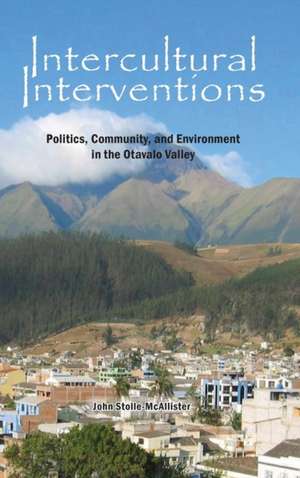Intercultural Interventions
Autor John Stolle-McAllisteren Limba Engleză Hardback – 6 mar 2019
The movement's fight for the rights of Indigenous peoples, while focused on issues of land rights, political participation, autonomy and cultural difference, never called for separation from its majority Mestizo population. Instead, the movement articulated its demands around a call for interculturality, that is, a process through which the country's different cultural groups ought to seek out new relationships built on equality, respect, coexistence and mutual learning to create the conditions for a more just and sustainable country. While on the surface such a proposal might seem little different than multiculturalism, it staked out a decolonial position by recognizing that not only were cultural groups different, but that their relationships were built on historic and continuing inequality. They demanded, therefore, a profound transformation of cultural, political and epistemological structures.
Intercultural Interventions: Politics, Community, and Environment in the Otavalo Valley documents and analyzes how the concept of interculturality intervened in theoretical discussions of social change, the disruption of colonial-era political institutions in Otavalo and Cotacachi, the re-constitution of the idea of Kichwa community, and how intercultural strategies were used to define and implement solutions to environmental problems. By paying attention to the often uneven and ambiguous ways in which interculturality intervened in people's public lives as a result of the success of the Indigenous movement, this book contributes to decolonial theory by connecting that critique to the complex changes that took place in Andean Kichwa Ecuador of the first part of the twenty-first century.
Preț: 496.23 lei
Preț vechi: 539.39 lei
-8% Nou
Puncte Express: 744
Preț estimativ în valută:
94.95€ • 99.34$ • 78.88£
94.95€ • 99.34$ • 78.88£
Carte disponibilă
Livrare economică 12-26 martie
Livrare express 26 februarie-04 martie pentru 37.14 lei
Preluare comenzi: 021 569.72.76
Specificații
ISBN-13: 9781621964254
ISBN-10: 1621964256
Pagini: 294
Dimensiuni: 157 x 235 x 22 mm
Greutate: 0.63 kg
Editura: Cambria Press
ISBN-10: 1621964256
Pagini: 294
Dimensiuni: 157 x 235 x 22 mm
Greutate: 0.63 kg
Editura: Cambria Press
